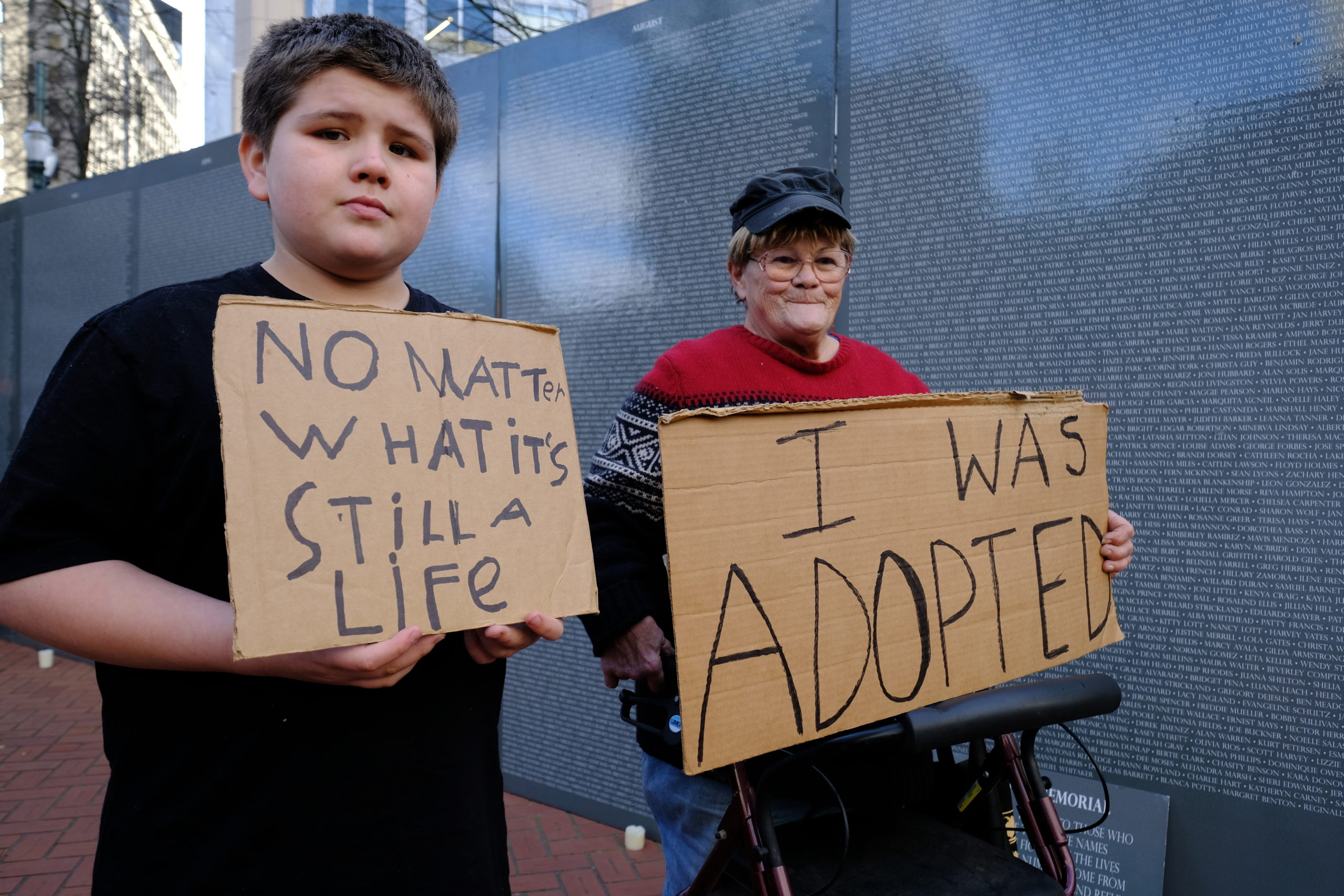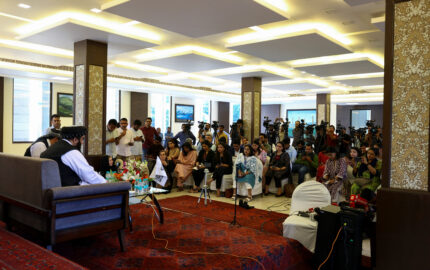Days after the U.S. Supreme Court reversed Roe v. Wade, declaring a constitutional right to abortion no longer existed, news outlets responded with stories suggesting how this landmark decision could be a boon for those seeking to adopt. And people like me braced ourselves for what was sure to be one-sided reporting.
I’m an adult adoptee — those babies and children do grow up — and I’ve become increasingly weary of the celebratory way adoption is portrayed by journalists who don’t cite data and don’t interview anyone who was actually adopted. I’m also a journalist, and years ago used skills I learned as a newspaper reporter to file a FOIA request on myself with state agencies in Michigan, find an unredacted clue in a hospital record, and use it to uncover my birthmother’s identity.
My adoptive parents were supportive of this search and, when I found my birthmother, she told me she’d yet to recover from relinquishing me. We were able to answer many of each other’s questions before she died in 2009. Adoptees do not sign confidentiality agreements and, as someone whose job it is to uncover hidden information in the public’s interest, I felt I had a right to know my own history. I’m not sure who the state thought was being protected by sealing all early data about my life, but it wasn’t me.
Data is also one of a journalist’s most effective tools, yet in my experience reporters rarely if ever reference scientific studies when reporting on adoption, unless it is to cite the number of prospective adoptive couples waiting for an infant. This kind of simplistic reporting has only intensified in our post-Roe environment, with journalists continuing to get even basic reporting about adoption wrong.
Here are some thoughts on why that is, and how we can do better.
For starters, adoption is a parenting decision and abortion is a reproductive decision. For reporters to equate one as a solution for the other provides nothing of value to readers and perpetuates a false equivalency.
For example, in “If Court Overturns Roe v. Wade, More Infants Might be Placed for Adoption,” Wall Street Journal reporter Clare Ansberry, spends 11 paragraphs on what we in the newsroom I work in call a “non-story.” Essentially, some people say more babies will be “available” for adoption, while others disagree or are unsure.
Likewise, Mary Kay Linge, in the New York Post, reports the end of Roe v. Wade could be “an answered prayer” for childless couples. The story contains one primary source, an adoption consultant. Neither reporter sources information from adoptees or references data on how adoptees fare long term. If they did, perhaps readers could learn what the mental health community has known for decades.
Studies consistently show adoption is traumatic for babies and children and is associated with behavioral and mental health issues throughout an adopted person’s life. For example, adoptees are more likely to be diagnosed with depression, anxiety, bipolar disorder, ADHD, post-traumatic stress, and addiction. A University of Minnesota study that looked at 10 years of records from three large adoption agencies found adoptees were four times more likely to die by suicide than non-adoptees.
Researchers in the late 1990s found 60 to 85 percent of teens at a California correctional school, and 50 to 70 percent of teens at an Illinois correctional school, were adopted. A more recent study by the Institute for Family Studies in Charlottesville, VA showed students who were adopted were 10 times more likely to be diagnosed with severe emotional disturbance and three times more likely to be expelled from school.
Researchers cited a number of factors for this, from possible gaps in prenatal care to early family stress, especially among children removed from families where there was alcoholism and substance abuse, to internalized grief, even for infants, after being severed from their biological family.
These statistics don’t fit the standard adoption narrative, and I’ve rarely seen them in print outside their initial publication in academic journals. Adoption adversity stories are published, but the adversity they detail is the adversity faced by adoptive parents and have a positive, even celebratory tone. For example, The New York Times published, “The Joy in Finding Your Chosen Family,” on June 25, the day after the Supreme Court voted 6-3 to overturn Roe v. Wade.
Reporting does not have to portray adoption as “good” or “bad.” Adoptive parents can be loving and they can be asked by reporters how they will prepare for adoption-related issues regularly faced by adopted children, teens, and adults. When adoptees try to speak publicly about these issues, we’re vilified.
Journalists bear some responsibility for this. Because reporters have historically portrayed adoption in such a positive light, when adoptees criticize what the public believes “saved” us, it makes people uncomfortable. Or, as writer, essayist and adoptee Kristen Steinhilber, who tweets as @girlxadapted, put it: “society’s privilege of viewing any adoption thru an idyllic lens has been allotted at the expense of adoptees who’ve spent their lives bullied into silence.”
Before I filed that FOIA on myself, I knew nothing about my history beyond the boilerplate language in a single page of “non-identifying” information the Michigan Children’s Aid Society provided to my adoptive parents and they gave to me.
At the doctor’s office, I’d write “I don’t know” on medical history forms.
As a kid, I filled in family tree homework with the names of my adoptive parents’ ancestors, which even in kindergarten, I knew was a lie.
When I was pregnant with my own children, I had no idea whether I was also carrying an inherited disease.
I’ve since learned much of the “non-identifying” information provided to me by the agency that finalized my adoption was untrue. My birthmother did not relinquish me so I could have a better life. She was a freckle-faced redhead studying to be a librarian, and she signed the adoption papers because her parents threatened to stop paying for college if she didn’t.
My adoptive parents did not hide my adoption from me, and instead encouraged me to ask questions and answered as many of them as they could, decades before this kind of openness was acceptable. Yet I continue to struggle with being adopted. This sense of unease I and others feel is rarely portrayed in stories about adoption.
The way to write about adoption is to include everyone’s voices. Reporters would never write about police without interviewing a police officer, would not cover a school story without first talking with teachers and students. How can you write about adoption without talking with adoptees?
The answer is, you shouldn’t be.
Severance, a magazine and community for those who were not raised by their biological family, offers good information on how to fairly cover the issue. And Gabrielle Bruney tackles it well in “Rewriting the ‘Fairy Tale’ Adoption Narrative,” published in Jezebel in 2019. Adoption is a reproductive issue in its own right, Bruney says, one that deserves to be fully examined outside of pro-life/pro-choice politics.
The real story of adoption, like my own lived experience, is richer, more complex and more human than journalists have so far reported. I am more than a “solution” to abortion.
Mardi Link is an enterprise reporter for the Traverse City Record-Eagle in Traverse City, Michigan. She is CNHI’s 2019 Reporter of the Year and won the 2021 Best Investigative Reporting and Best Column awards, from the Michigan Associated Press Media Editors. She is the author of five non-fiction books.



